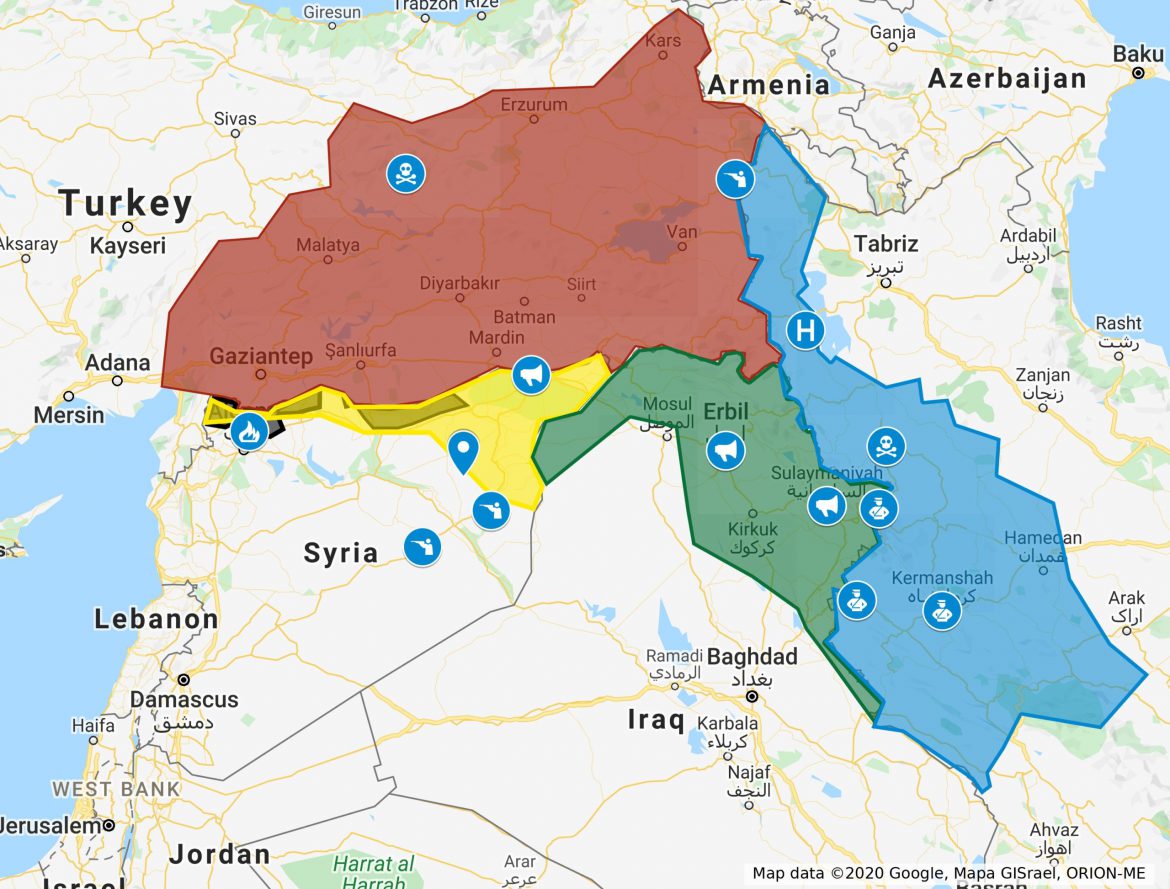1.2K
Iran
- The total number of coronavirus deaths in Iran’s Kurdish region exceeded 500 last week. Concurrently, the Hengaw Organization for Human Rights reported seven of the 100+ prisoners infected with the virus in the Central Prison of Urmia died, while the virus continues to rampage through several other Iranian prisons. Meanwhile, the Iranian regime continued its crackdown on journalists documenting its response to the coronavirus pandemic and arrested a prominent social media reporter named Shahram Safari in Sarpol-e Zahab last week. Safari, whose posts are widely followed in Iranian Kurdistan, was released on bail on Sunday. Likewise, the Kurdistan Human Rights Association (KMMK) reported a journalist named Amir Babie received a two-month sentence in Kermanshah. In Marivan, the Islamic Revolutionary Court sentenced a Kuridsh activist, Woria Da’alangiz, to four months in prison for eroding “public discipline.” Da’alangiz was previously jailed for celebrating Iraqi Kurdistan’s independence referendum on September 25, 2017.
- The Iranian regime executed the Kurdish political prisoner Mustafa Sailimi, who was previously a member of the Democratic Union of Kurdistan-Iran (KDPI), on Saturday, sparking anger throughout Iran’s Kurdish region. Sailimi and several other inmates had previously escaped from a prison in Saqqez, and several human rights organizations accused the public security forces (Asayesh) in the Iraqi Kurdistan town of Penjwen of handing Salami to the Iranian regime. Both the local Asayesh and the Patriotic Union of Kurdistan (PUK) denied these allegations, and the Kurdistan Regional Government (KRG) is currently investigating the incident.
- Iranian border guards ambushed a group of border porters known as (Kolbars) near Mako city on Monday, killing one and wounding two. Also, on Monday, Iranian authorities wounded a Kolbar near Chaldiran.
Iraq
- The KRG Ministry of Health, citing its most recent statistics, claimed the coronavirus has infected 330 people and caused four deaths in Iraqi Kurdistan. The Sulaymaniyah Governorate, responding to the recovery of over 100 of its 144 infected individuals, decided to partially reopen the province and relax restrictions on businesses like restaurants. At the same time, Erbil Governorate is scheduled to announce plans regarding the relaxation of counter-coronavirus measures on April 16.
- ISIS (Da’esh) terrorists ambushed Iraqi forces conducting security operations in Kirkuk Governorate’s Daquq District on Monday morning and killed two Iraqi Army personnel. The ambush was followed by several hours of clashes between Da’esh and Iraqi forces. Though no casualty numbers were confirmed for either side, Rudaw reported four Iraqi personnel were kidnapped during the fighting. Simultaneously, Da’esh operatives attacked a Peshmerga checkpoint near Kalajo village, killing two. The region, commonly referred to as the “Disputed Territories,” has been plagued by an increasing amount of Da’esh activity since Iraqi forces supported by Iranian-backed militias expelled Peshmerga forces on October 16, 2017.
- The President of Kurdistan Region Nechirvan Barzani echoed the PUK’s position in welcoming the nomination of the new Prime Minister of Iraq Mustafa al-Kazemi. al-Kazemi replaced Adnan al Zurfi after the latter failed to win the support of the Council of Representatives of Iraq’s Shiite blocs.
Syria
- Da’esh operatives continued to exploit the increasingly permissive security environment created by the coronavirus pandemic in northeastern Syria by launching an attack on Deir Ez Zour Governorate’s al Suwar town and killing two Syrian Democratic Forces (SDF) personnel. Simultaneously, Da’esh launched several assaults on Syrian regime forces in areas between Hama and Deir Ez Zour, seizing control of stretches of highway near Kobajjep and damaging oil and gas fields in Sha’ir and Hayyan. Meanwhile, SDF personnel backed by US airpower conducted several counter-Da’esh raids and announced the capture of four Da’esh personnel on Monday.
- Turkish-backed jihadists attacked the SDF-controlled villages of Um Hosh and Harbel in Aleppo Governorate last week, targeting farms and causing property damage. Concurrently, the Turkish government settled several hundred more Syrian refugees in the Kurdish town of Geri Spi (Tal Abyad) that it seized control of in October 2019.
- The Kurdish-led Autonomous Administration of North and East Syria (AANES) again requested assistance from the World Health Organization in combating the coronavirus pandemic. Though no cases have been reported in Syria’s Kurdish region so far, the AANES continues to lack an adequate number of COVID-19 test kits. Meanwhile, the AANES locked down Aleppo Governorate’s Um Hosh village after a former Syrian regime soldier visited while infected with the virus. Additionally, in Qamishli, two people traveling from Damascus were quarantined after they were suspected of carrying the virus.
Turkey
- The Grand National Assembly of Turkey passed a law granting temporary release to prisoners to halt the spread of the coronavirus. The pro-Kurdish Peoples’ Democratic Party (HDP) voted against certain articles of the law that exclude thousands of political detainees charged with “terror.” Among those denied temporary release are jailed Kurdish politicians, Kurdish activists, and members of the HDP. Amnesty International released a statement expressing disappointment with the law, whose primary supporters are the ruling Justice and Development Party (AKP) and the ultranationalist Nationalist Movement Party (MHP). The coronavirus has infected at least 61,049 people and caused 1,296 deaths in Turkey so far.
- The Turkish government mailed the remains of a deceased member of the Kurdistan Workers’ Party to his mother last week, sparking anger and disapproval from Turkey’s Kurdish population and human rights organizations. At the same time, a photo of the mother holding her son’s remains in a box was posted on numerous social media accounts.

